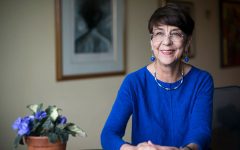
There is no easy way to choose the right program to carry you through your graduate school journey. You are looking for a transformative experience that you cannot find elsewhere, but perhaps unsure of what you are looking for in terms of specific academic opportunities. It is common for prospective students to be unsure of what exactly they want to study, which makes choosing where to do your research even harder. If only you could tailor your master’s degree to fit your specific interests….
The Institute of Political Economy at Carleton University has a long history of offering students the freedom to follow their interests, and study what they are truly passionate about. The Institute is unique. It is the only program of its kind offered in Canada, says Dr. Cristina Rojas, who has been the Director of the Institute of Political Economy for the past two years.
Dr. Cristina Rojas is a professor of political science at Carleton, specializing in political economy. Originally from Colombia, she did her undergraduate degree in philosophy as well as her master’s degree in development there, before moving to the United States to study at Harvard.
Rojas completed her doctorate here at Carleton, preferring the Canadian approach to politics and political economy.
Much of her research has focused on Colombia’s political economy in the 19th century. Rojas studies the South’s path to development, exploring alternative political economies that differ from North American or Western understanding of development.
A few key words that might describe Rojas’s research interests are critical development, postcolonial theory, social policy, and citizenship studies.
Rojas has written extensively about citizenship, indigeneity and regimes of civilization. In the past few years, she has shifted her focus to Bolivia.
By walking alongside Indigenous Bolivian women, Rojas has studied the relationship between the meaning of territory and life-projects and how practices surrounding territory is intricately linked to the understanding of the world.
This is only a glimpse into the wide breadth of work and research possible in political economy. Touting a brilliant roster of over 50 cross-listed faculty members from over 10 different departments, an understatement is calling this master’s program diverse. Students can choose to enroll in classes in a wide-range of disciplines, and are guided through the registration process by Donna Coghill, the Administration head/guru of the Institute. It is pretty much impossible for them not to find a supervisor whose research interests align with theirs in some way, she explained.
Rojas has supervised the research projects and theses of many Political Economy students, like Daniel Tubb and Judy Meltzer. Graduates from the program find their niche and go on to work in a variety of fields: the extractive mining industry, labour policies, food systems, food sovereignty, Indigenous peoples, or even migration. Often, students are passionate about social justice. They want to understand poverty, housing, health, and the welfare state.
“Students have an identity built around political economy, but they are also able to match their own interests in the areas I mentioned, and do political economy analysis in these different areas,” said Rojas.
Next year, the program will be celebrating 30 years since its first seminar. The spirit of collaboration lives on, with great projects, conferences and a host of grant opportunities for those who choose to pursue their graduate studies at the Institute of Political Economy.